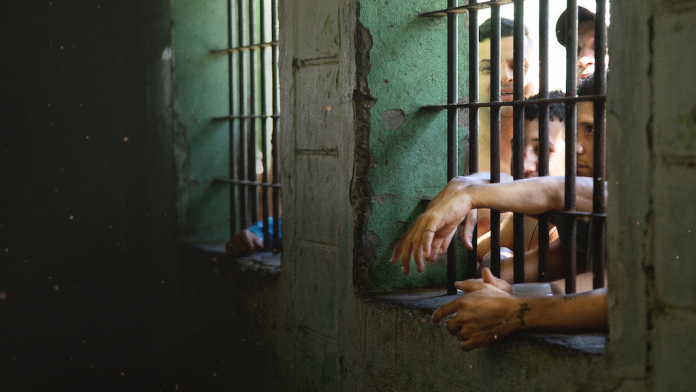Three inmates lost their lives and two were seriously injured after a fire at the Satu Mare prison in north-western Romania. The fire at Satu Mare prison began when detainees burned their mattresses to protest against the restrictions imposed by the prison authorities amid the Covid-19 outbreak. The deaths and injuries brought renewed attention to prison conditions in Romania, which have been the subject of a Council of Europe report.
The inmates were reportedly angry with the prison’s decision to reduce the visiting hours. Detainees at the Satu Mare prison serve their sentences in a semi-open regime. Across Europe there have been concerns that restrictions related to the global pandemic could increase tensions inside prisons. However, in Romania, the situation is likely even more fraught because the country’s prison conditions have repeatedly drawn international concern and criticism.
Romania’s prisons gained negative attention when Netflix screened their hit documentary series called Inside The World’s Toughest Prisons , in which journalist and television presenter Raphael Rowe checks in to a prison for seven days, living the life of a prisoner and filming the conditions that he sees, as well as getting to know some of the inmates and staff. The episode set in Craiova prison, Romania, has received some of the most attention, perhaps because the conditions were surprisingly bad for a country that is a member of the European Union. Rowe talks about the chronic overcrowding and poor conditions he sees during his week in the Romania jail.
Rowe also voices his suspicions that the prison guards had removed some of the inmates for his benefit, to make the cells seem less overcrowded, even though with some inmates removed, he still found the spaces overcrowded. When Rowe visits the higher security section of the prison, he says: “What they are trying to do is show me a perfect cell. The guards are trying to manage what I see and what I don’t see.” Even when they do find a cell that they are willing to show him, he is still appalled by the conditions: “It’s hard to convey how a human can be kept inside such a confined space for so many years. You need to feel this space to understand how oppressive it is. Even the hardest man will find it difficult to cope with this.”
There had already been scrutiny of Romania’s prison conditions due to a report by the Council of Europe’s Committee for the Prevention of Torture and Inhuman or Degrading Treatment or Punishment (CPT). The conditions discovered fell far below expected European standards for the treatment of prisoners. The report stated that, during their visit, the team was informed of allegations of physical ill-treatment of prisoners by prison staff, notably by members of the masked intervention groups based in four of the prisons visited.
The CPT found the situation at Galati prison particularly alarming, describing a climate of fear. The report detailed allegations of ill-treatment by staff corroborated by medical evidence and raised serious concerns over the lack of recording of injuries by the prison healthcare service and failures to investigate allegations effectively. The report also documented cases of severe beatings and sexual abuse by prisoners in their cells, notably among young adult prisoners at Bacău Prison.
Recommendations included the establishment of a cell-share risk assessment process for persons entering prison before they are placed in an admission cell, followed by implementing an individual risk and needs assessment. It was also recommended that the Romanian authorities invest far more resources in recruiting and training additional prison staff and developing their professionalism. The CPT report further found that conflicts of interest of health care staff represented an underlying problem which eroded the prisoners’ trust in their clinicians. The CPT recommended that the Romanian authorities ensure that clinical staff are independent of prison staff.
The report also highlighted the lack of psychiatric input at all of the prisons visited, and that inmates suffering from a mental health disorder had to cope with conditions of detention which impaired their mental and physical health. A particularly concerning aspect of the report was the allegation of physical ill-treatment by police officers inflicted on detainees. The reported allegations consisted primarily of blows inflicted by police officers against suspects, seemingly for the primary purpose of extracting a confession. The CPT also commented on the investigation into allegations of police ill-treatment and recommended that prosecutors strictly apply the criteria of effectiveness.
The CPT criticised the holding of criminal suspects and remand prisoners in police arrest detention centres for up to two months or more, where they are exposed to a greater risk of physical intimidation and psychological pressure.
These concerns are accentuated by the reported poor material conditions, inadequate healthcare resources and an impoverished regime for persons held in arrest detention centres. The CPT urged the Romanian authorities to consider converting arrest detention centres into proper pre-trial detention facilities and placing them under the authority of the Ministry of Justice and the National Prison Administration and not the Interior Ministry and national police command structures.
The debate about Romania’s prisons continues on the domestic agenda too. An interview took place in which Romania’s G4 Media highlighted the comments of Denis Darie, the manager of Rahova prison, that none of the buildings at his prison meet the required standards.
Since the CPT’s report, there have been further concerns that an electronic monitoring system has been introduced, without any clarity over who will manage this system or who will take responsibility for importing the technology. The Romanian parliament is currently analsying the law around electronic tagging, which currently excludes those convicted of “white collar” crimes such as corruption or abuse of office from being punished via the electronic tagging system, putting them in the same category as violent criminals or those involved in human trafficking, a policy that has drawn criticism from international human rights observers.
The tragic deaths in the fire at Satu Mare prison this Spring will reinforce humanitarian concerns that prison conditions in Romania are far below the standards expected inside a European Union country. It is particularly troubling that this situation is compounded by the potential of contamination spreading out of control during the current pandemic.



























